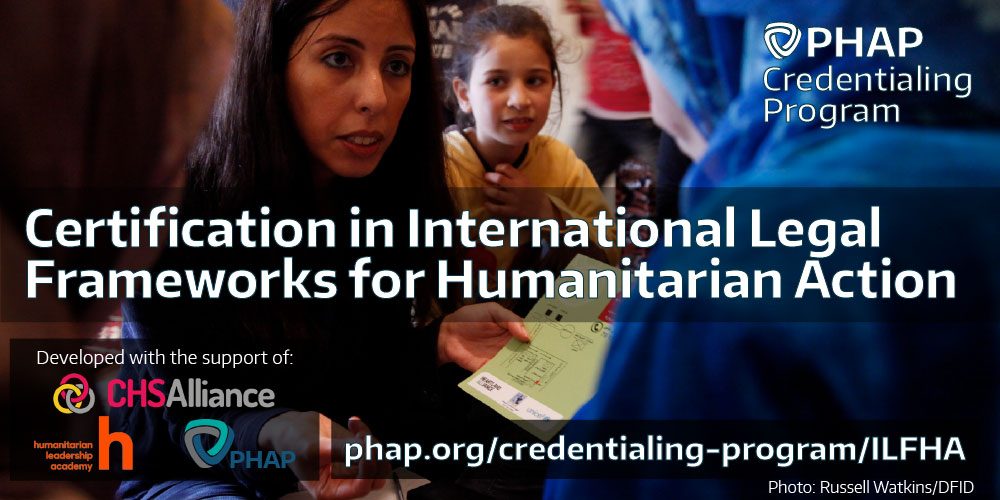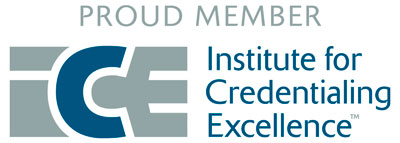Certification in International Legal Frameworks for Humanitarian Action (ILFHA)

The PHAP Credentialing Program Certification in International Legal Frameworks for Humanitarian Action (ILFHA) is designed for humanitarian practitioners and others in related fields who need to demonstrate an understanding of the fundamentals of international legal frameworks for humanitarian action. The ILFHA certification is highly relevant for individuals working in international organizations, NGOs, the Red Cross/Red Crescent Movement, government institutions, academia and research, as well as others engaging with the humanitarian sector. The ILFHA certification is a stand-alone certification designed to apply to practitioners at all levels of professional experience.
What is the scope of the ILFHA certification?
An ILFHA certification holder understands the fundamentals of international law, how it is created, who it binds, and why it is relevant to humanitarian action. A certification holder is also able to identify the key sources, principles, and provisions of international human rights law, international humanitarian law, international criminal law, international refugee law, and laws protecting internally displaced persons. He or she understands how these main bodies of public international law are relevant to humanitarian action in situations of armed conflict or natural disaster. Moreover, a certification holder is able to identify mechanisms for preventing violations and enhancing respect for international law, and how the different applicable rules may be enforced on the domestic, regional, and international level. Lastly, a certification holder is able to identify the ways that humanitarian actors can utilize legal frameworks to further humanitarian aims.
Why pursue certification?
The ILFHA certification is one of the six modular PHAP certifications that aim to recognize knowledge and skills in complementary areas of humanitarian practice. The ILFHA certification provides an opportunity for practitioners to demonstrate professional competencies within the scope of the certification. Employers in the humanitarian sector are increasingly using the certifications in their professional development and recruitment. All certified individuals receive a verifiable digital badge as proof of their achievement that can be added to their CVs, social media profiles, email signature, or personal websites and portfolios.
How do you prepare for the certifications?
Candidates may prepare themselves for the certification assessments in any way they choose and no specific courses are required.
PHAP provides a variety of free tools, guidance and useful links to learning resources in order to prepare for the certification assessment in a targeted way. The Self-Assessment and Diagnostic Test are both useful tools to help you identify where you have the greatest need for improvement. By using the Self-Assessment and Diagnostic Test together, you can get an accurate picture of where you currently stand in your assessment preparation. To fill any identified gaps, you can use the Study Guide that provide overviews of key concepts and links to relevant learning resources
- The Self-Assessment sets out the scope of the certification and the specific required competencies for certification holders. The Self-Assessment is a useful tool to help you reflect on where you have the greatest need for improvement.
- The Diagnostic Test is a free online test that is similar to the official certification assessment, but designed to help pinpoint where you may need to prepare further. The Diagnostic Test gives an indication of how you would score on the official certification. Upon completion, you will receive a personalized and detailed Diagnostic Report, indicating your strengths and weaknesses in the different areas of the certification.
- The Study Guide provides overviews of key concepts, links to relevant learning resources, study questions and scenarios, structured around each individual competency required for the certifications. To optimize your preparations, you can use the Self-Assessment and Diagnostic Report to identify the specific competency statements for which you still need to prepare and then refer to those chapters in the Study Guide.
What does the ILFHA assessment entail?
The ILFHA certification requires passing a rigorous 60-question multiple-choice assessment. This assessment is made by and for humanitarian practitioners according to the highest international standards for developing professional certifications (ISO 17024:2012).
The certifications can be taken 24/7 through any computer with a stable internet connection and webcam. Each certification assessment credit costs USD 80 (USD 65 for PHAP members) and includes a free re-take in case you do not pass on your first attempt.

As a proud member of ICE, we stay informed on best practices in developing and administering quality certification programs so that we may better serve you.
PHAP is proud to be a member of the Institute for Credentialing Excellence in show of our support of the credentialing community and our commitment to strive for excellence in our certification programs.